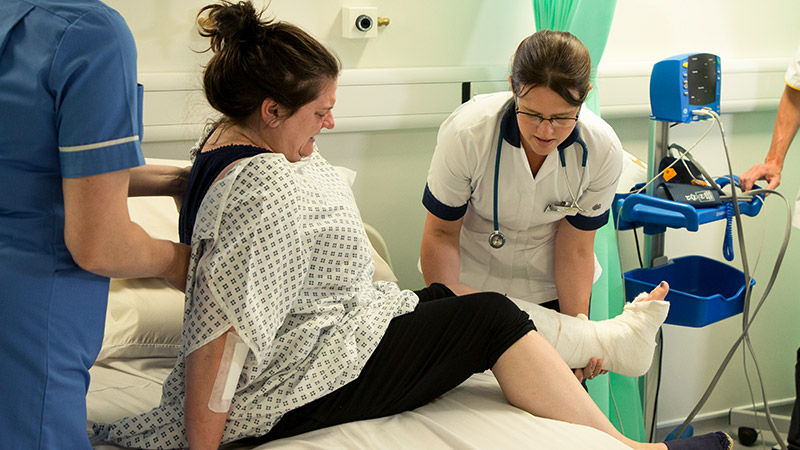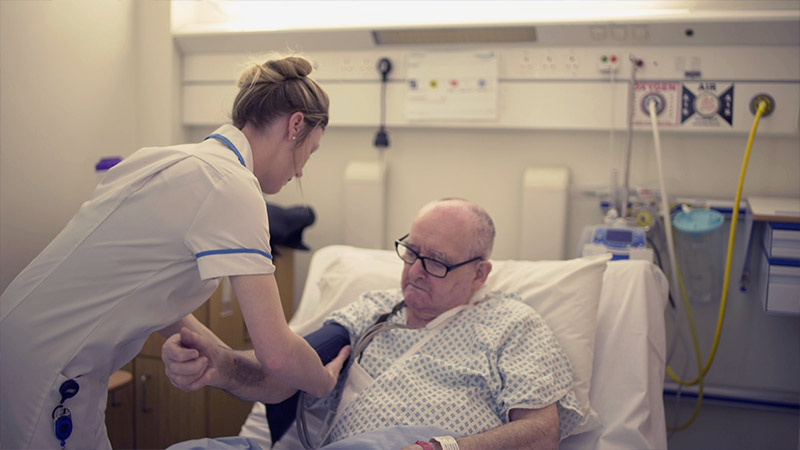Minor Injury and Illness Management
PGCert
Key facts
Course code
PGC-MIM
Start dates
September 2024 / January 2025
Application deadline
1 August (for a September start) 1 December (for a January start)
Location
Course length
Part time: 12 months (Sept), 20 months (Jan)
This course is not available to students classed as International for fees purposes.
Overview
Our Postgraduate Certificate in Minor Injury and Illness Management is for UK registered healthcare professionals. The course allows you to achieve professional development and gain experience in preparation for practice:
- as an Emergency Care Practitioner (ECP)
- within minor injury or illness focused care within urgent or acute care.
You will cover a range of minor injury and illness conditions across the age spectrum, delivering the best outcome of care for the patient and their family. You will critically analyse the assessment, diagnosis management and treatment of patients. And you will develop your:
- knowledge
- skills and understanding of assessment
- planning, delivery and evaluation of care.
We place importance on your experience within the educational process, from both a personal and professional perspective.
Relevant national and international research and evidence based literature informs course content. This helps you expand the breadth of your studies and develop a depth of critical analysis and evaluation of practice.

How to apply
Entry requirements
- UK or overseas degree from a recognised institution or equivalent professional or other qualification.
- Students must hold professional registration with the relevant Nursing or Allied Health Professional Body/Council in the UK.
- Students will have a minimum of 3 years post-registration experience in a relevant care environment.
- Employed in a role that will support development of Clinical Skills during the programme
- Be working in a relevant clinical environment in which they can achieve the clinical skills required.
- Have access to an appropriate practice supervisor within that area
- Support of their line manager.
Terms and Conditions of Enrolment
When you accept our offer, you agree to the Terms and Conditions of Enrolment. You should therefore read those conditions before accepting the offer.
Application process
Apply through our Moodle Portal.
Tuition fees
Questions about fees?
Contact Student Finance on:
Tuition fees
Fees quoted are for the first year only. If you are studying a course that lasts longer than one year your fees will increase each year.
How and when to pay
Tuition fee instalments for the semester are due by the Monday of week 1 of each semester. Students are not liable for full fees for that semester if they leave before week 4. If the leaving date is after week 4, full fees for the semester are payable.
- For information on payment methods, please see our Make a Payment page.
- For information about refunds, please visit our Refund policy page
Financial support and scholarships
Additional costs
Please be aware that some courses will involve some additional costs that are not covered by your fees. Specific additional costs for this course are detailed below.
Learning and assessment
You will study two compulsory modules on this PG certificate
- one single module (20 credits) NURS7030 Advanced History Taking and Assessment
- one single module (20 credits) CPD70XX Assessing and Managing Minor Illnesses
- one single module (20 credits) CPD70XX Assessing and Managing Minor Injuries
On completing the course successfully, you will be awarded the Postgraduate Certificate in Minor Injury and Illness Management with 60 CATS credits at Level 7.

Study modules
Learning and teaching
This programme is taught via a blended learning approach, it involves a mixture of pre session reading, online activities and presentations blended with face-to-face seminars, problem based learning and clinical skills.
The teaching, learning and assessment strategy of the programme reflects its student centred, patient-centred and practice-focused approach. Each module has an appropriate division between structured learning activities and private study. Opportunities for sharing existing and developing skills, knowledge and experience, are maximised.
Assessment
Assessment methods used on this course
We will assess you with a variety of methods. Assessments give you an opportunity to demonstrate knowledge as well as the critical and reflective analysis required for professional practice.
Advanced history taking and assessment:
Practice scenario assessment, and 'Evaluation of clinical skills practise' assessment
Assessing and Managing Minor Illnesses:
Poster presentation
Annotated bibliography
Clinical competencies
Assessing and Managing Minor Injuries:
OSCE
Clinical competencies
Programme changes:
On rare occasions we may need to make changes to our course programmes after they have been
published on the website. For more information, please visit our
changes to programmes page.
